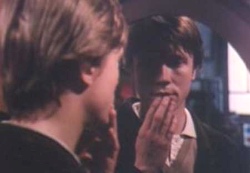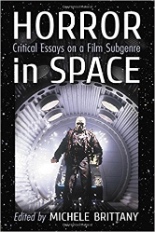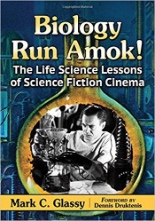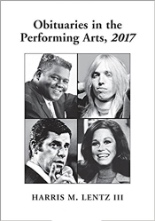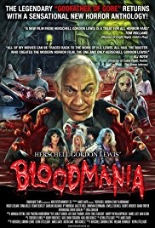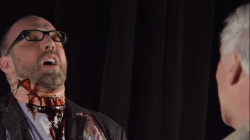
 After all the carnage and tragedy that befell so many humans in the events of 2015’s Jurassic World, not to mention three previous adventures, one would think the last thing those survivors would do is go back to that island. Yet that is exactly what they do in Jurassic World: Fallen Kingdom, for a reason returning screenwriters Colin Trevorrow and Derek Connolly do not work hard enough to sell credibly: because 11 species of dinosaurs need to be saved from extinction before an about-to-blow volcano covers Isla Nebula with a thick sheen of lava.
After all the carnage and tragedy that befell so many humans in the events of 2015’s Jurassic World, not to mention three previous adventures, one would think the last thing those survivors would do is go back to that island. Yet that is exactly what they do in Jurassic World: Fallen Kingdom, for a reason returning screenwriters Colin Trevorrow and Derek Connolly do not work hard enough to sell credibly: because 11 species of dinosaurs need to be saved from extinction before an about-to-blow volcano covers Isla Nebula with a thick sheen of lava.
So off go former theme-park exec Claire (Bryce Dallas Howard, Spider-Man 3) and velociraptor whisperer Owen (Chris Pratt, Guardians of the Galaxy Vol. 2), back to the island that very nearly — and often! — served as their gravesite. This time, Claire brings two millennials from her new PETA-esque dino-protection nonprofit: a sassy “paleoveterinarian” (Daniella Pineda, TV’s The Detour) and a systems analyst (Justice Smith, Paper Towns) whose scaredy-cat act gets really old really fast.
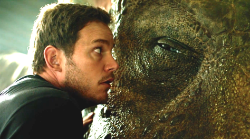 Escorting them is a military team whose crusty leader, Wheatley (Ted Levine, The Silence of the Lambs), wields a pair of pliers to extract a tooth from each dinosaur they capture, so you know how that’s gonna turn out. His well-armed crew is tasked with shipping the prehistoric creatures to the palatial estate of infirm philanthropist Benjamin Lockwood (James Cromwell, Species II) for safekeeping, but Wheatley and Lockwood’s right-hand man (a wonderfully slimy Rafe Spall, Prometheus) have other, more personally lucrative ideas.
Escorting them is a military team whose crusty leader, Wheatley (Ted Levine, The Silence of the Lambs), wields a pair of pliers to extract a tooth from each dinosaur they capture, so you know how that’s gonna turn out. His well-armed crew is tasked with shipping the prehistoric creatures to the palatial estate of infirm philanthropist Benjamin Lockwood (James Cromwell, Species II) for safekeeping, but Wheatley and Lockwood’s right-hand man (a wonderfully slimy Rafe Spall, Prometheus) have other, more personally lucrative ideas.
Although the back half of Fallen Kingdom taking place within the Lockwood mansion is unique to the five-film franchise, Jurassic-newbie director J.A. Bayona (The Orphanage) fails to spatially orientate the grounds to a level of layout that could foster and support suspense among audiences. Where and from what distance predator and prey exist is any viewer’s guess, yet also inconsequential, because any time Claire and Owen back themselves in a corner – metaphorical or otherwise — and face certain doom, Trevorrow and Connolly simply pilfer their cop-out climax from the previous sequel … and Bayona lets them, each and every time. It’s a lazy play on the page, and even more so on the screen.
Sloppy, choppy and as tired as the tranquilizers shot throughout, Jurassic Park: Fallen Kingdom simply goes through the motions, never fully engaging. Toward the end, the film grows as silly as Godzilla on Monster Island, then concludes with a frustrating cocktease of a coda that all but guarantees the worst minute of the next Jurassic movie will be of greater quality than this one’s best. As it stands (read: without tumble gymnastics), Fallen Kingdom is a virtual remake of 1997’s The Lost World: Jurassic Park, no longer the lone disappointment in the Steven Spielberg-produced series — a feat that took 21 years, give or take 65 million. —Rod Lott

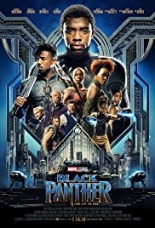


 Because Sebastian was born with a caul over his face, his brother, Joe (Emilio Gutiérrez Caba,
Because Sebastian was born with a caul over his face, his brother, Joe (Emilio Gutiérrez Caba, 